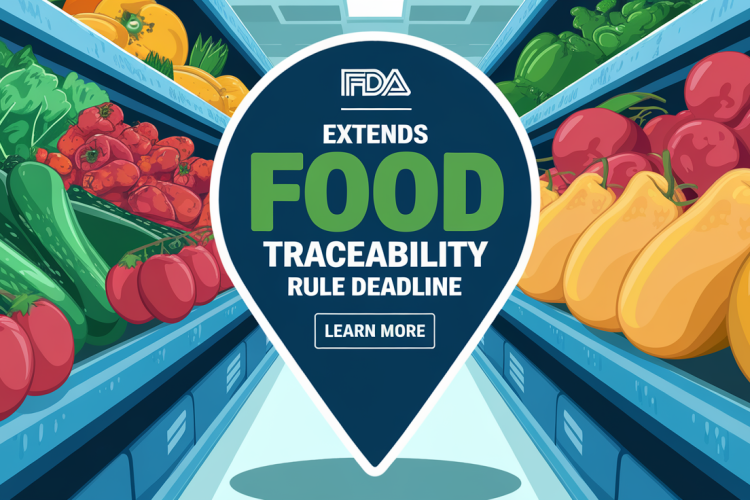The FDA has announced a significant update regarding the Food Traceability Rule, extending the compliance deadline by 30 months to mid-2028. This decision, made on March 20, 2025, addresses concerns from industry stakeholders about the implementation costs and complexity of the rule. The original deadline was set for January 1, 2026. The extension provides additional time for businesses to adapt to the new requirements.
Understanding the Food Traceability Rule
The Food Traceability Rule, mandated by the Food Safety Modernization Act (FSMA) of 2010, requires producers, processors, packers, and retailers to maintain detailed records of certain foods. These records must include Key Data Elements for foods such as fresh fruits, vegetables, soft cheeses, and some seafood. The rule aims to improve the FDA’s ability to trace food products during outbreaks, with businesses required to report information within 24 hours. Development of the rule took 14 years since the FSMA’s approval in 2010.

As noted by the FDA, “The compliance date extension does not amend, nor do we intend to amend, the requirements of the final rule, which will improve food safety and protect public health” (FDA). I appreciate the FDA’s commitment to enhancing food safety measures. For more information on the rule and its implications, you can visit the FDA’s official website.
Impact on Food Industry Stakeholders
The Food Traceability Rule affects a broad range of businesses, including farms, manufacturers, wholesalers, distributors, grocers, and restaurants. Exemptions include USDA-regulated companies, small retail food establishments, and certain products like potatoes. Industry groups have welcomed the extension, citing the need for more time to adapt systems and practices to the new requirements. Some businesses may need to invest in new technology to ensure compliance.
To prepare for compliance, businesses can start by reviewing their current record-keeping practices and identifying areas for improvement. They can also explore new technologies and systems that can help them maintain the required records. For instance, some companies may benefit from implementing a digital traceability system. I recommend submitting your favorite local dessert shop to our business directory to get more visibility.
Some of the key steps businesses can take include:
* Reviewing and updating record-keeping practices
* Investing in new technology to support traceability
* Training staff on the new requirements and procedures
The additional time provided by the extension will allow businesses to make these necessary changes.
FDA’s Commitment to Food Safety
The FDA emphasizes that the extension does not alter the rule’s requirements, which are designed to improve food safety and public health. The additional time is intended to facilitate proper coordination across the supply chain. I think it’s essential to highlight the FDA’s commitment to food safety, especially considering recent concerns about public health risks associated with FDA layoffs, as discussed in this article on FDA Layoffs and Public Health Risk.
The FDA’s efforts to enhance food safety measures are crucial in preventing foodborne illness outbreaks. By maintaining detailed records and reporting information quickly, businesses can help the FDA identify and respond to potential outbreaks more effectively. For example, the FDA’s efforts to strengthen food safety rules have been instrumental in reducing the incidence of foodborne illnesses, as seen in the trends from 2014 to 2022 on Foodborne Illness Trends.
Related FDA Food Safety Initiatives
The FDA is also reforming the Generally Recognized As Safe (GRAS) rule in 2025, requiring companies to notify the FDA and provide safety data for new ingredients. This change is expected to close loopholes that allowed companies to self-affirm ingredient safety. I believe this reform is a step in the right direction, as it will enhance FDA oversight and improve public health protection. More information on the GRAS reform can be found in this article on FDA Ends GRAS Pathway.

To prepare for traceability compliance, food businesses should focus on improving their technology systems, record-keeping practices, and supply chain coordination. I suggest exploring new technologies and submitting your favorite dessert recipe to be featured on our site through our recipe submission page. For those interested in food-themed merchandise, you can visit our Churro & foodie-themed apparel shop.
Next Steps for Businesses
As the compliance deadline approaches, businesses should continue to prepare for the new requirements. This includes investing in new technologies, training staff, and updating record-keeping practices. I recommend staying informed about the latest developments in food safety regulations and best practices. For more insights on FDA’s efforts to strengthen food safety rules, you can read this article on FDA Strengthens Food Safety Rules, and explore the potential impact of FDA layoffs on public health.



